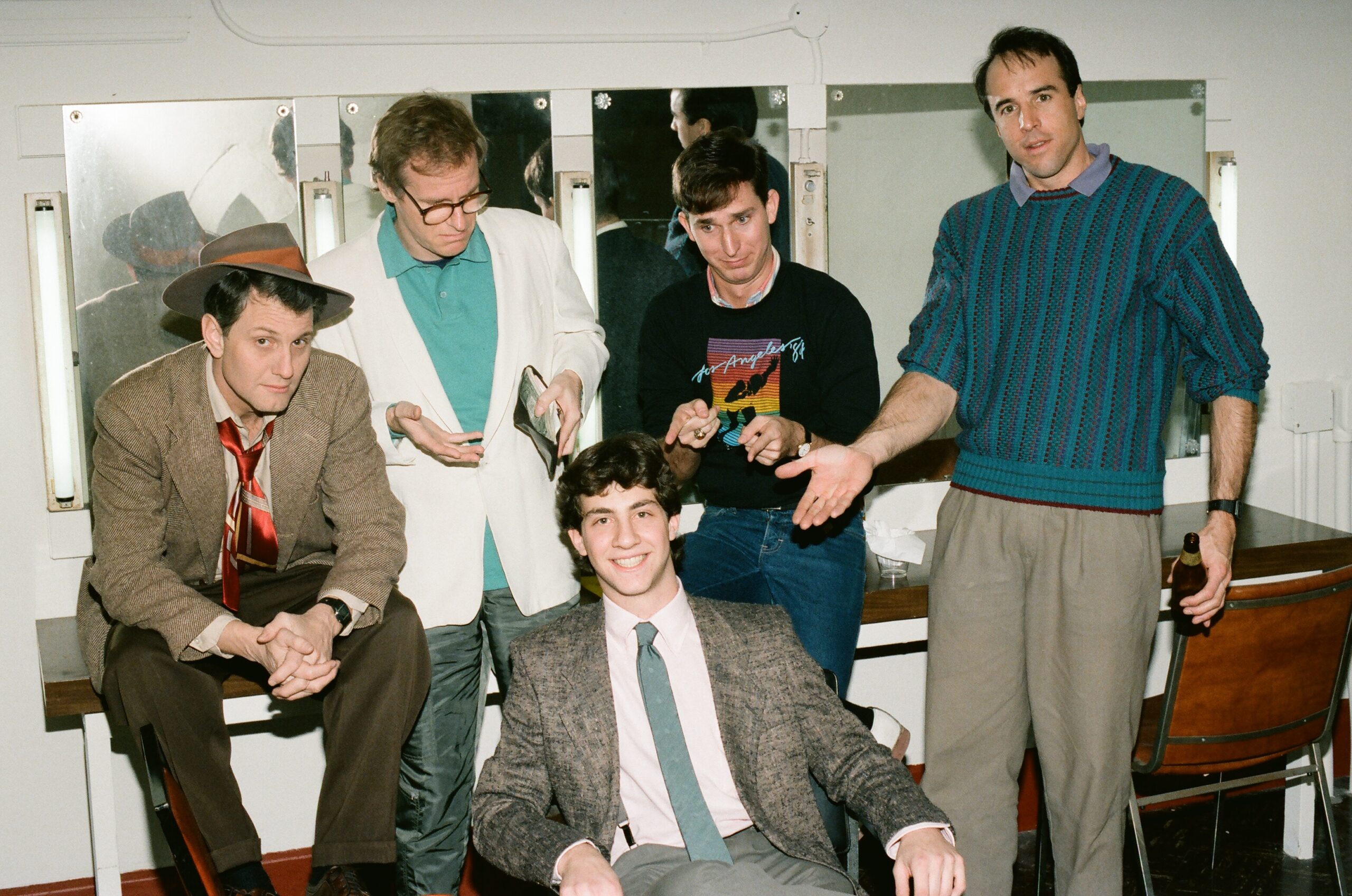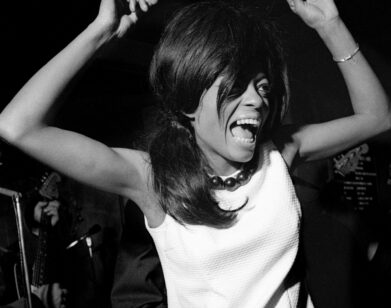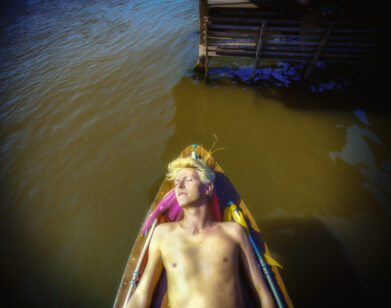JUST FOR LAUGHS
The Making of Judd Apatow, by Cameron Crowe
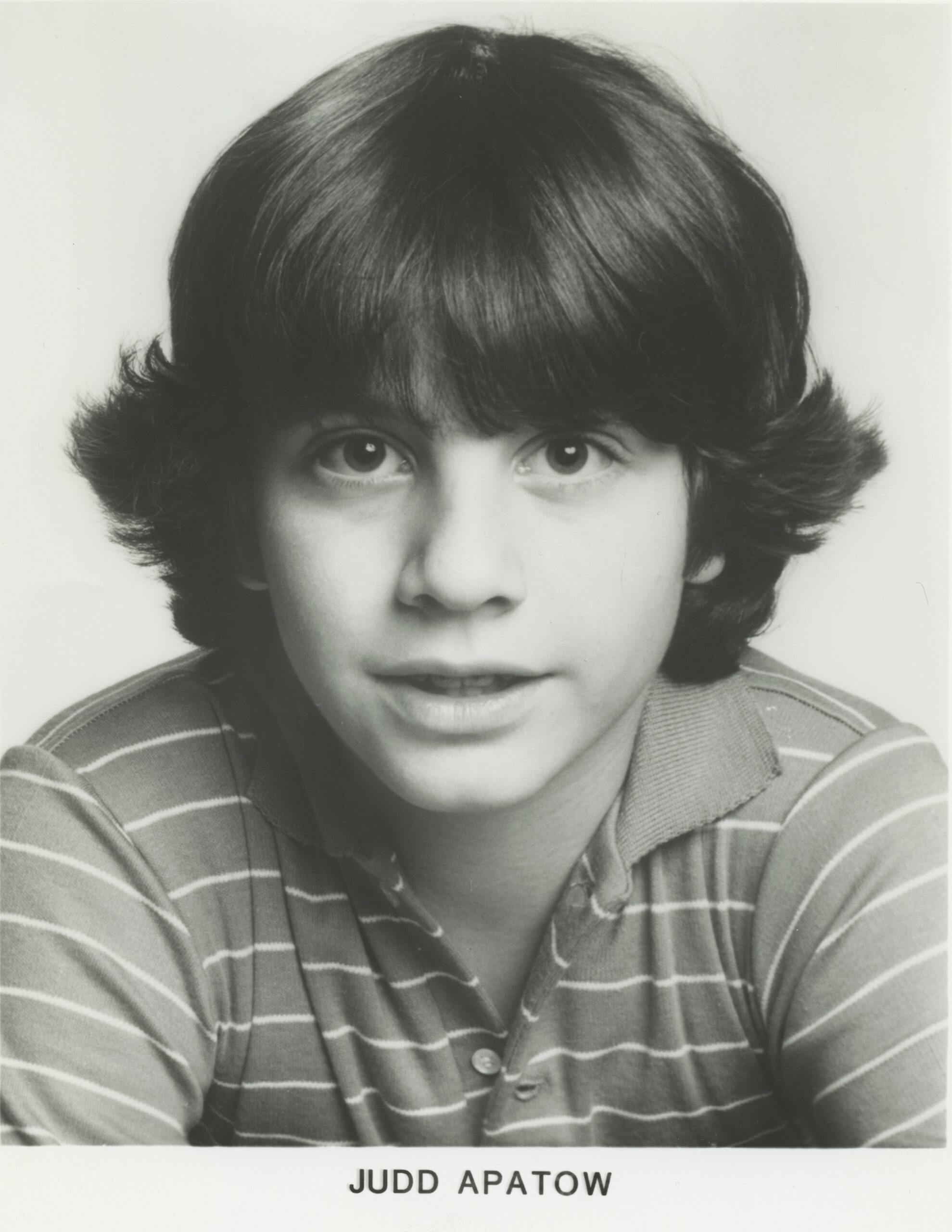
All photos courtesy of Judd Apatow.
If there’s one thing Emmy Award-winning writer and producer Judd Apatow will admit, it’s that he tends to get a little bit obsessed. So how does a comedy savant honor his one true love? By making a scrapbook that contains every headshot, script, and joke he’s ever tossed off, amounting to a comprehensive encyclopedia of the Apatow oeuvre. In his visual memoir Comedy Nerd, the 57-year-old takes us back to his origins, from unceremoniously begging Steve Martin for an autograph to starring in a Vanity Fair photoshoot alongside the man himself decades later. The lesson? “Seek out your heroes,” says the filmmaker and patron saint of rock journalism Cameron Crowe, whose own memoir, The Uncool, comes out on the very same day as Apatow’s. While strolling down memory lane earlier this month, the two reflected on their charmed lives in show business.
———
JUDD APATOW: It’s fun to talk. Right, Cameron?
CAMERON CROWE: Absolutely. Where are you right now?
APATOW: I am in my office.
CROWE: I love it. Here you are.
APATOW: Come into work every day and punch up the same script every day. Try to fix 20 pages a day. Every six days I get to the end and I start at the beginning and then I do it again for the next six days and then maybe one day it will be worth something.
CROWE: Your book is magnificent. It’s the box set of you. It’s fucking emotional and funny and, as Lena Dunham says, “wise.” It’s like form meets content because at any point you can pick it up and find a nugget, something to hang on to, and it gives you a feeling, then you can leave and come back at any point.
APATOW: It’s funny that both of our books are coming out on the same day.
CROWE: It’s crazy.
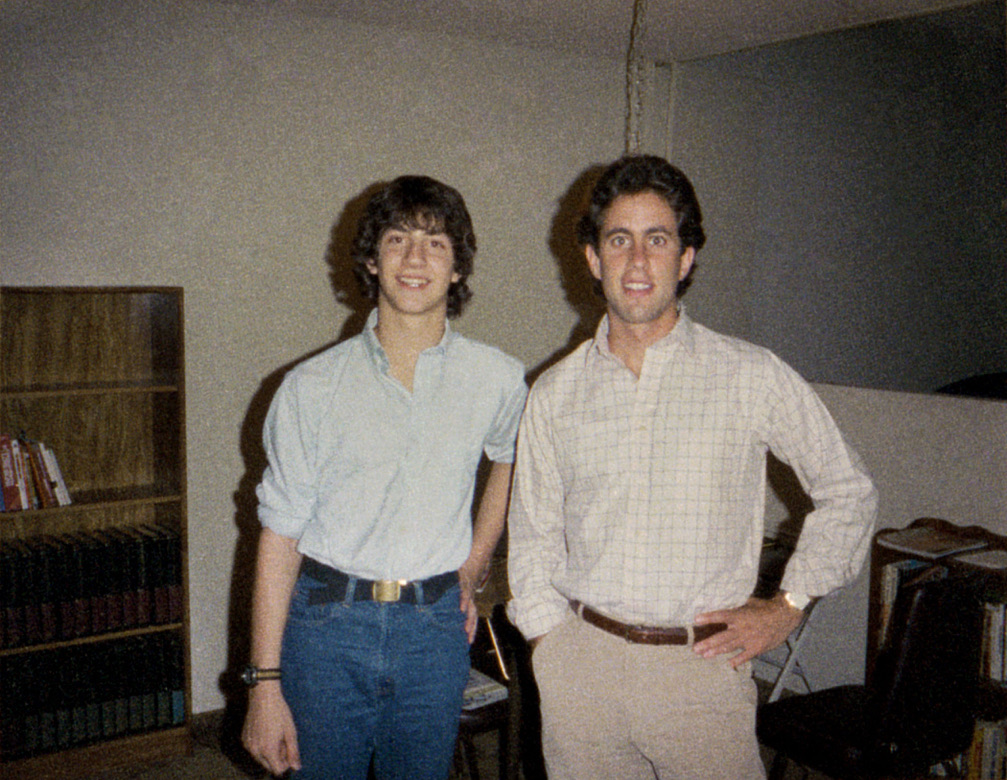
APATOW: And they’re both snapshots of moments. My book is about my obsession with comedy and yours is about your music journalism career, I guess the early part of it. It still continues, you could say.
CROWE: It does continue.
APATOW: But it is so funny because you’ve been such a giant influence on me as a human and as a writer and director. So much of what I came to understand about this type of work came from watching your movies.
CROWE: That means a ton to me, particularly because my mother, who’s a big character in my book, would always say to me, “You’ve got to be more like Judd. He’s prolific with great results. He knows how to do it. Judd’s made two movies in the time it’s taken you to figure out where to place a comma.” And she loved your movies and I love your movies and I love that you sought to put together your own SNL troupe, as you say in the book.
APATOW: Yeah.
CROWE: My big thing diving into the book is how you’ve managed to manage your time, where you can be on the phone with one person going over scenes late at night, doing notes, having kind of an inspiring walk in the morning and visiting Eric Roth and then taking time to go to shows, host shows, listen to new music. What is the secret to your time management?
APATOW: It’s funny because when I first attempted to write a good screenplay, I thought, “I think you do what Cameron and James Brooks do, which is to spend years obsessing on something and then you make it perfect.” So me and Owen Wilson wrote this script together. This was right after we did The Cable Guy, which we worked on for years and then no one would make it. So when I couldn’t get it produced, I realized that my plan had failed. And then I started rejecting this idea of perfectionism because it was such a time-eater. And I started going, “What if I wrote one movie in the morning and a different one in the afternoon and tried to get a few things going?” And that is why I’ve had to focus on time management. It’s much better now.
CROWE: Right.
APATOW: But a lot of that happened because everything that me and all my friends were doing was getting rejected. And then when I finally had a hit, when I was one of the producers of Anchorman, suddenly the door opened and all of those rejected scripts suddenly were reappraised. But I do look back and go, “What a psychotic, manic lunatic you were at that moment just trying to pull it all off.” I hired a driver and he would drive me to each set because at one moment we were shooting Pineapple Express and Walk Hard and Talladega at the same time in L.A. Now I’m finally getting into my Cameron Crowe phase of trying to be a better writer and lock it down. So much of what I’ve done has been improvisational and very loose, but that’s also because I was doing too much and didn’t have time to get anal.
CROWE: What was one of the scripts that was in your drawer that kicked the door open and got made?
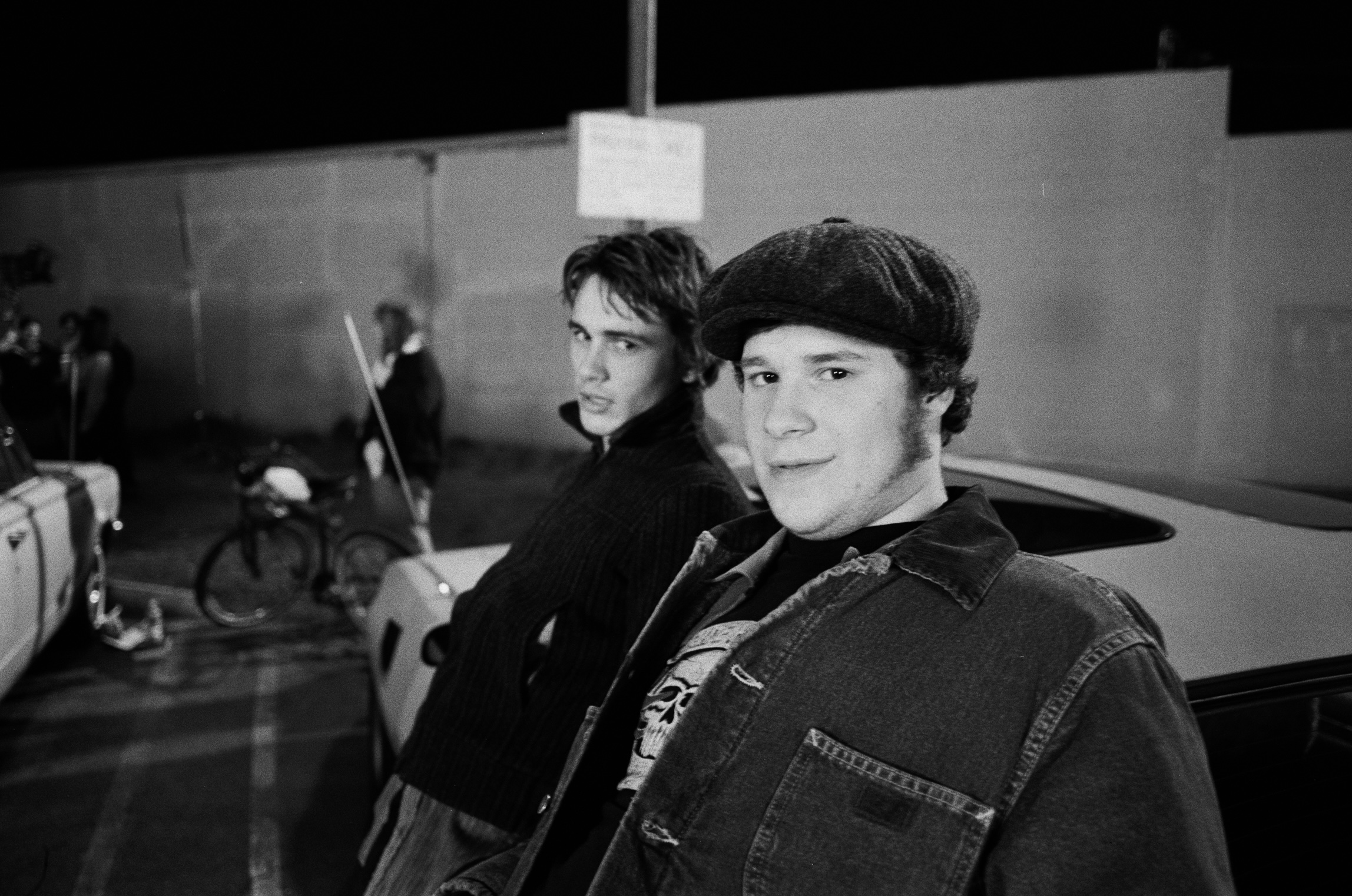
Photo courtesy of Gabe Sachs.
APATOW: Well, Seth Rogen and Evan Goldberg showed me their first rough draft of Superbad when we were working on Freaks and Geeks and Undeclared. We would do table reads and then they would do punch-ups and get rejected. And then at one point I said, “Let’s add a producer who’s more powerful than me.” Then suddenly he got hired to be the head of Paramount and we were like, “Oh my god, we’re definitely going to get to make the movie now.” The first thing that guy did as the head of Paramount was to say he wasn’t going to make Superbad. [Laughs] Finally, a few years later, when The 40-Year-Old Virgin succeeded and we were doing Knocked Up, we were able to get Superbad produced.
CROWE: You were kind enough to invite me to an early preview of Superbad.
APATOW: I think the first time we ever showed it.
CROWE: I remember all those guys that were milling around before the screening afterwards were standing up a little straighter and talking about their ideas and this Petri dish was exploding with all that was to come. This is one of the things I wanted to talk to you about because I live the lonely life. It took our mutual pal Tom Cruise to actually say to me at one point, “Let me take you to the set of Judd Apatow’s movie and you will see a not-so-lonely life that produces really fucking good stuff. ” Visiting your set was incredible. Of course, legendarily, you were shouting lines out and it was a gorgeous madness.
APATOW: What a day that was because we were shooting This Is 40 and you rolled up in this big SUV that was completely souped up, with a big-screen TV in the back.
CROWE: Not my car.
APATOW: It was Tom’s car.
CROWE: As if you didn’t know.
APATOW: And I remember Leslie had to shoot a scene and I said, “Yeah, you’re going to have to shoot this in front of Cameron Crowe and Tom Cruise.” And everyone was like, “Oh my god.”
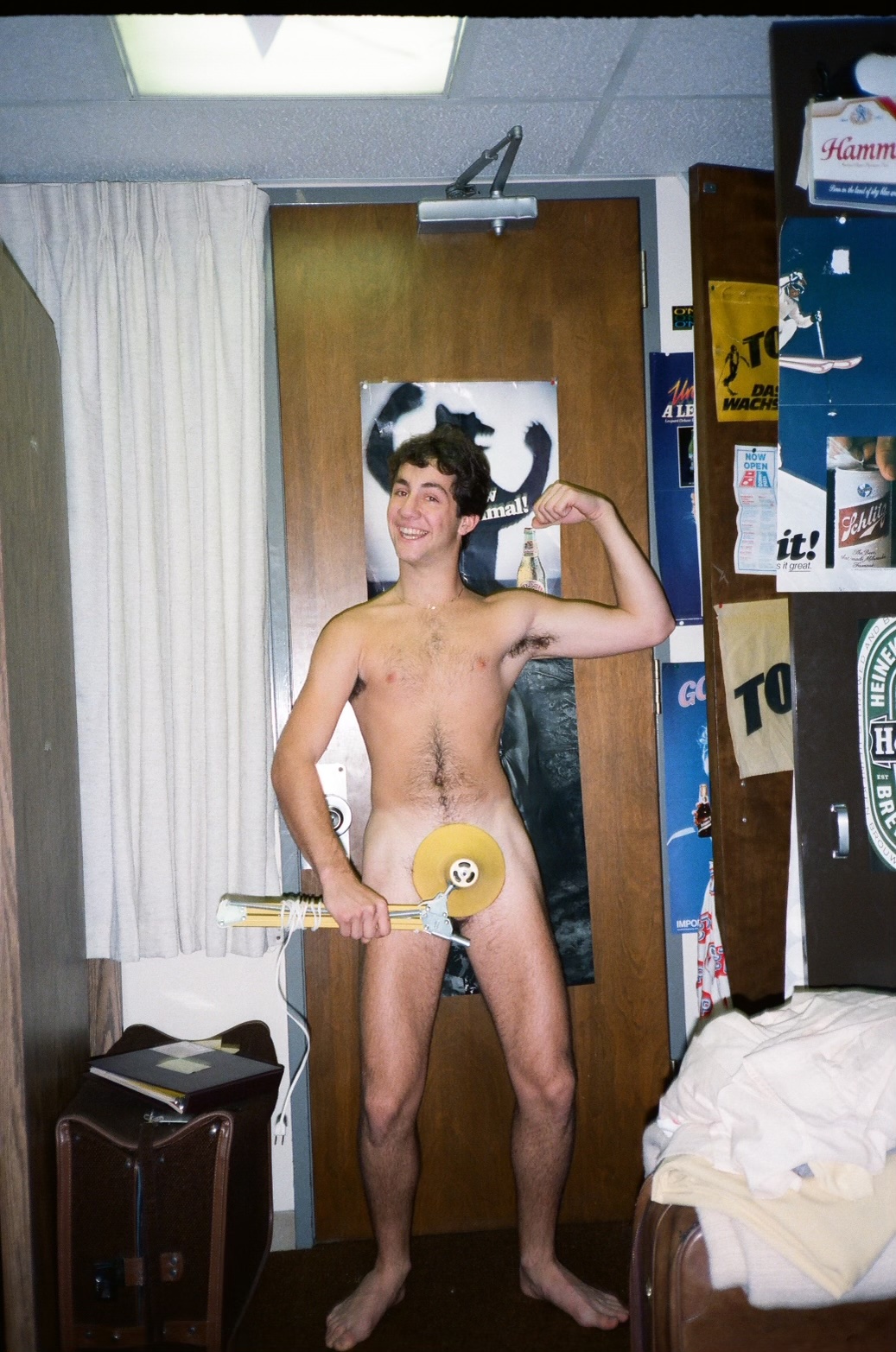
CROWE: It’s true. Your book is chock-full of these beautiful little keepsakes and one of them, I’m going to ask you to tell the story because this is emblematic of so much of the cool stuff. The Steve Martin story, young Judd Apatow lightly stalking Steve Martin. You’re 10 at the time?
APATOW: I’m 12. My grandmother lives in Beverly Hills. So I visited her and she knew where Steve Martin lived. So anytime we went anywhere I said, “Let’s use Bedford.” He delighted me so much in my childhood. I was born in ’67, Saturday Night Live came on when I was seven years old and he made me laugh so hard. So one day we drove by and he was outside washing his car or something and I asked him for an autograph and he said, “No, I don’t sign autographs at my house.” And then I said, “Well, will you sign it in the street?”
CROWE: This was the best improv ever.
APATOW: He says, “No, I really can’t. Then people come by.” I understand that now because if someone knocks on my door, I call the police. [Laughs] So anyway, I go home and I write him this letter to be funny, but I am kind of annoyed. “Dear Steve, I’m your biggest fan, but you treat your fans like garbage. You wouldn’t live in that house if I didn’t buy all of your records and go to all your movies. So if you don’t send me an apology, I’m going to send your address to Homes of the Stars and you’re going to have tour buses passing by 24 hours a day.” And then I put it in his mailbox, which is the ultimate stalker move, no stamp. Six months later, he sends me an autographed book of Cruel Shoes. And in it he wrote “To Judd, I’m sorry! I didn’t realize I was speaking to the—underlined three times—Judd Apatow, 1980.” So that’s 45 years ago and I’ve since gotten to know him a little bit. He’s the greatest person. He must’ve laughed at that letter or he wouldn’t have bothered coming up with a good joke for me. It was a gigantic moment.
CROWE: Did you ever talk to him about it?
APATOW: I did. We were in a meeting about something and someone asked us to tell the story. They said, “Steve, is that how you remember it?” And he goes, “In my memory I walked up to his door.” And then we did a photo for Vanity Fair where he’s in a tour bus outside of my house and I’m in a bathrobe, annoyed. It was one of the great blessings. But what do you think gave you the courage to speak to all of the rock stars?
CROWE: Same as you, I couldn’t be stopped. Looking back at the first person who gave me a backstage pass, it’s shocking how much access was available because it’s much different now, and for good reason. I was from San Diego. So in San Diego, they’ve already played L.A., they’ve already played San Francisco. They’re usually done with the tour. They go to San Diego and it’s like, “Oh my god, this is great. 16,000 surfers, the tour’s already over. Let’s just have fun.” And then, “There’s the kid that wants to interview us for a little paper, come on in.” And that gave me the courage to keep doing it. But what’s funny is I loved comedy too. Comedy was allowed in our house, but not rock. My mom brought Dick Gregory to her English class.
APATOW: I read that in your book. That’s incredible.
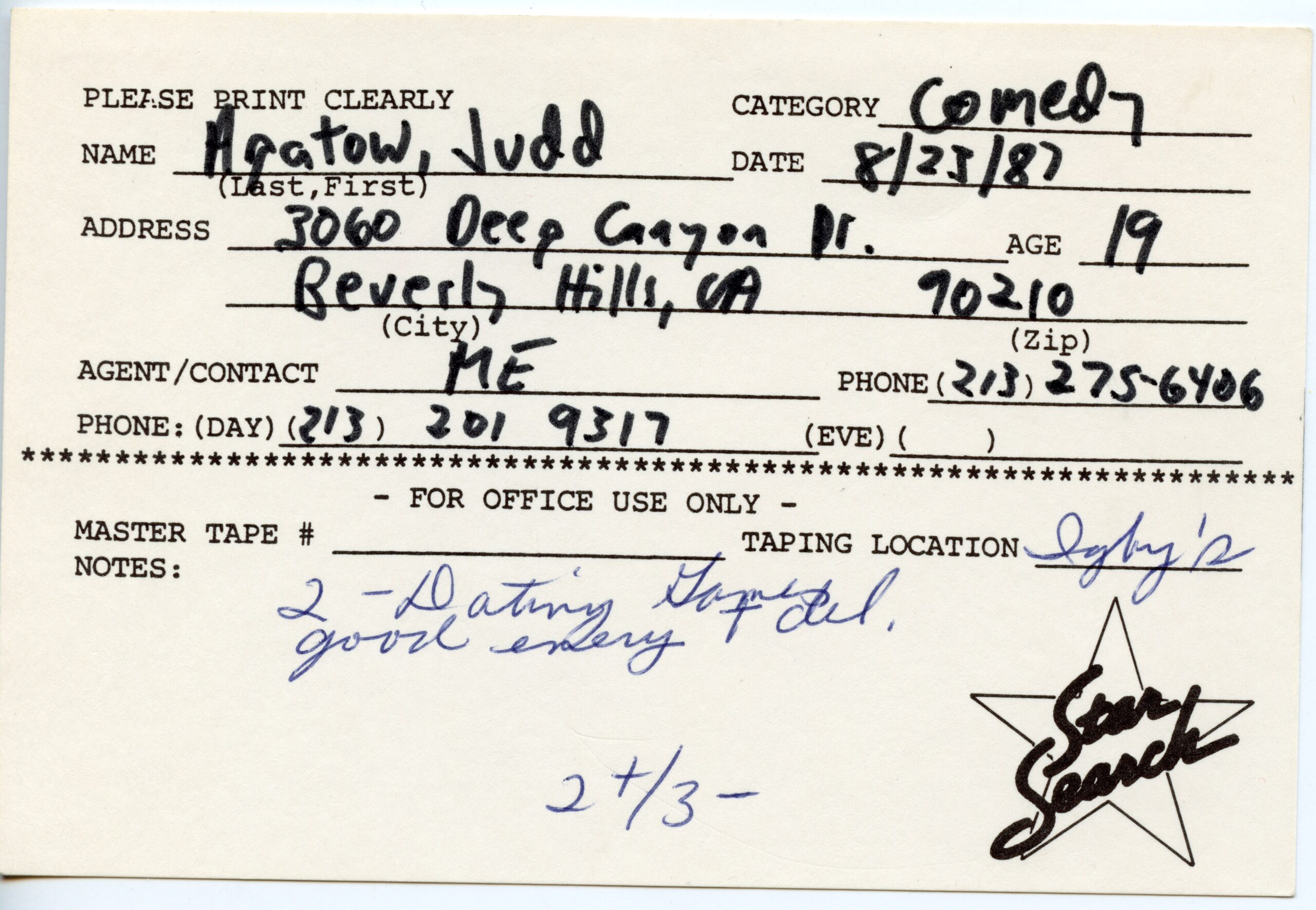
CROWE: I hung out with Dick Gregory. I was 14 and he treated me like I was 25. We talked about Marvin Gaye and the war and all this stuff. Your man George Carlin opened the door for me and gave me an early interview and I went back and looked at the transcript in preparation to see you. And what he tells me in the interview is, “I like comedy. I try and make it pretty so it’s easy to listen to and give it a rhythm. And I know poetry. So if I stay on this track, I might be able to turn funny to wise.”
APATOW: Incredible.
CROWE: And I’m like, “That’s what you tell Lena Dunham, that’s your credo.” And mine too, in a way.
APATOW: George Carlin was one of the first comedians I went deep with. But I do think about being young and seeing Fast Times and feeling represented by the kid who works in the movie theater. What was the name of that character?
CROWE: The Rat.
APATOW: So if you could imagine Judd in 12th grade watching that going, “Oh, I’m the Rat. I’m that guy.”
CROWE: In a tuxedo t-shirt. [Laughs] I love it. Now, Billy Wilder said, “The great gift you can have as a writer and a director is that they talk about your movie for 15 minutes after they leave.” What is the 15 minutes thing you want people to take away from Comedy Nerd?
APATOW: It’s about having an obsession and the way that it becomes what allows you to survive in the world. It brings so much joy, it brings so much stress, it brings so much heartache. And then you have this nostalgia for all the people and the collaborations and the connections. And I also look at the book and go, “What was wrong with me? Why did I work so much? How needy and insecure was I that I had to do so much?” And then as you go farther in it, it’s also about, “What do I want to say and what have I said and what’s left to be said?” As you get older and deeper and your perspective changes, you really think about the meaning of all of it and finding new ways to tell stories. So at the end of the book, I write a little bit about how it’s amazing to look back at what happened.
CROWE: And you did it in the world of comedy. I was not able to have insanely great interviews with the few comedians, with the exception of Carlin that I talked to. I remember going backstage to talk to Franklyn Ajaye.
APATOW: What about the comedian that you got to know, Leonard Barr?
CROWE: Leonard Barr taught me an interesting lesson. This is the first time I came to the Continental Hyatt house. Danny Sugerman took me there. At the time, he was showing me how the Hollywood rock scene works. The lobby is like an all-ages club. It’s roadies, it’s musicians, it’s people like me who found rock and it led them here and it was amazing. Alice Cooper came out of an elevator and ran through the crowd like a wrestler. I was high on it. And there I see Leonard Barr, the craggy-faced kind of cranky Tonight Show comic who dressed kind of frumpy, and he’s got a fedora hat. And I freaked out because he was a favorite in our family. So I went up to him and I touched him by the elbow to get his attention and I said, “You’re Leonard Barr, you’re amazing.” And he yelled at me, “Blow me, you fuck,” and scurried out of the Hyatt House to go to the Comedy Store. It shook me up. I was like, “Woah! What dark, dark game is played beneath this happy surface?”
APATOW: That was boundaries.
CROWE: Let’s just call him a visionary. He shared his truth with me, but it blew my fucking hair back. At which point Sugerman came up behind me and said, “Don’t you get it? Comedians, man, they’re dark, they’re pained, they’re consumed with rage. He fucking loved you, man. He shared it with you.” And it was kind of what we’re talking about, the truth of the comedian persona, which you so lovingly present in the book.
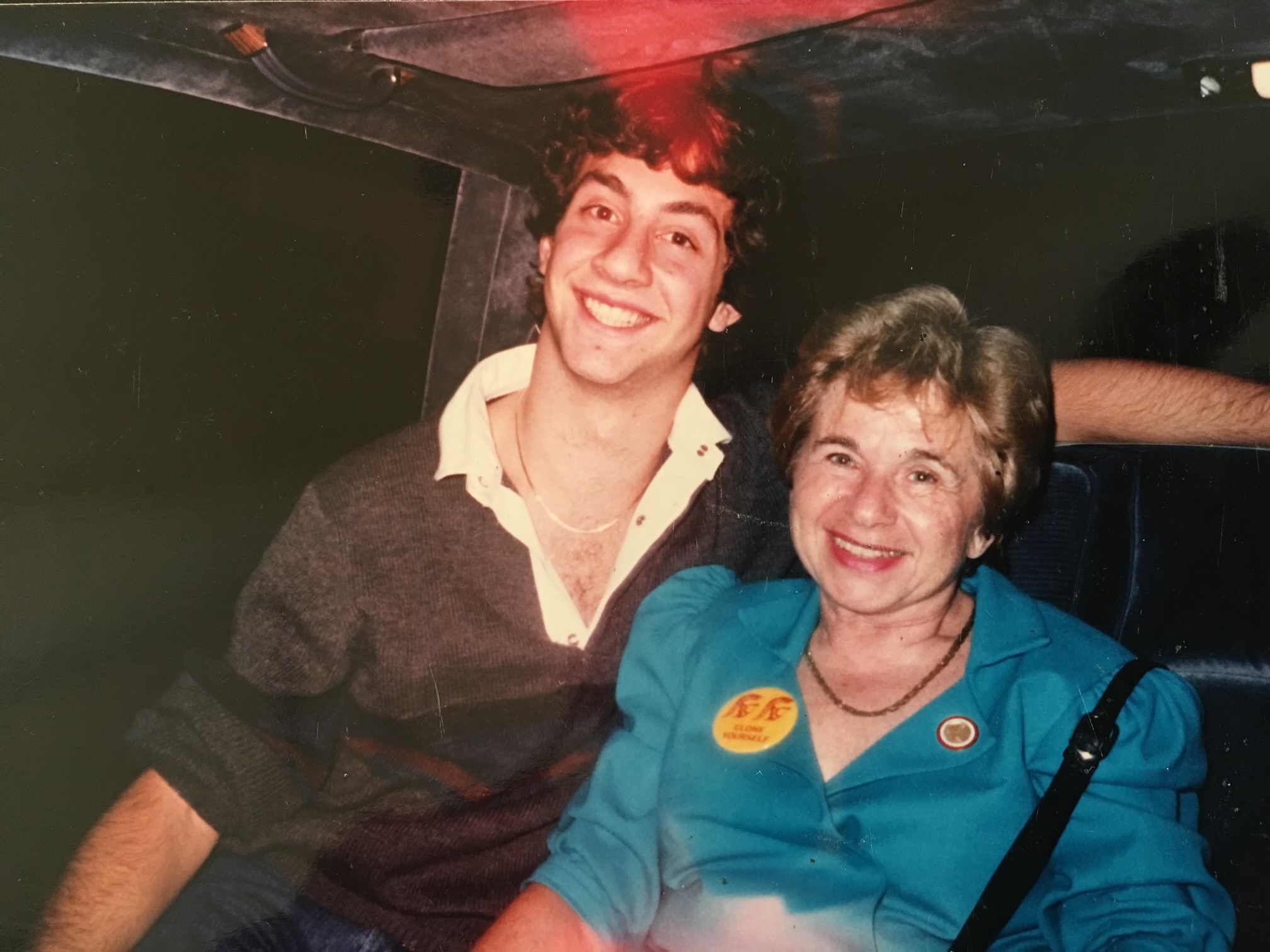
APATOW: I always think that you were born at the perfect time. Was it ’57, ’58?
CROWE: ’57, yeah.
APATOW: So you got to experience the ’60s with The Beatles. You were old enough to get everything that was happening.
CROWE: Just the tail end of that. My sister was more Summer of Love and The Beatles. I was more like Creedence Clearwater [Revival] and The Youngbloods, and The Who.
APATOW: But to be that age when it was all starting, when rock journalism was the Wild West so you could get in and get those opportunities. I mean, I don’t think it’s anything like that now.
CROWE: There’s barely any backstage anymore. I said to somebody in a band that’s like a pretty big legacy band recently, “Wow, what’s it like backstage?” And they were like, “Backstage? There’s no backstage. We fly in separately. It’s the stage and then we go home.” Which was shocking because backstage was like a commune. But what was interesting was that everybody thought it was ending soon. “Make hay while the sun’s still shining. There’s no way this much fun is going to last.”
APATOW: Really, people thought that?
CROWE: Oh, yeah. This is one of the things that Bowie said to me when I was a little guy. He said, “Take a look around. All of this will be forgotten.” He was in a yellow VW driving me back to Neal Preston’s house where I was staying in Los Angeles and it was like 7:00 in the morning and there were businessmen in cars next to him alongside and he’s saying, “This will all be forgotten.” I’m thinking, “It’s got to be true.” And what’s amazing is that, for a guy that knew so much about what was around the corner, he was wrong about that.
APATOW: Maybe that’s why it was all good, right? Because people weren’t building it for the long haul. They were very authentic and visceral and just expressing themselves. It wasn’t money-driven in the same way, I would assume.
CROWE: That is profound, Judd, because you’re exactly right and it’s still true. The people that make music that way are the ones that matter.
APATOW: What made you want to write this book? I mean, this is the book I dreamed you would write. I am endlessly fascinated by all of your adventures and the book that’s coming next, which you’ve shown me a little of, where you followed up on articles from the ’70s and ’80 and checked in with the same people now. I want to know how that’s going because that may be my favorite concept of all time.
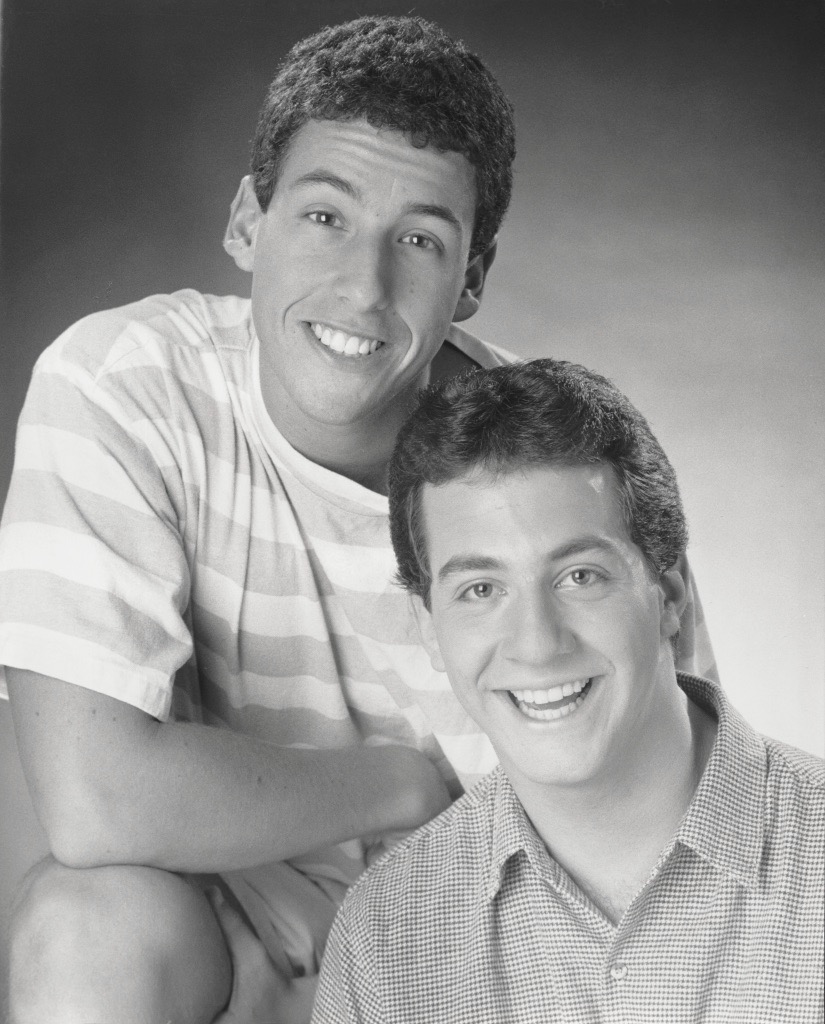
CROWE: Thanks, man. Well, I was really thrilled to send you a far-too-large PDF file of that stuff. This book actually grew out of writing introductions for the other book. I realized that I wanted to write for pure joy and just get it all down in a way on yellow legal tablets, longhand, the way I always used to write. The life that still speaks to me every day is when I was 15 and all those doors opened and I learned that life can give you an angel or two that says, “Keep doing it. Go say hi to this person.” And it goes back to your original question about what gives you the courage to do that. And I say, “Seek out your heroes.” Steve Martin was going to write you a letter back. He’s going to hit a tennis ball of comedy at you. Are you ready? And you were. Those are the great stories to tell.
APATOW: Well, I hope our books inspire young people to pursue their dreams and to be insane and take these kinds of chances. It’s funny because when you have kids, you always think about keeping them safe and you want their lives to go well, but at some point you realize the most important thing is that they have fire, that they have a passion for something. That’s the thing no one told you. So I hope these books make someone go, “I’m going to do something wild and try to make this happen.”
CROWE: Absolutely. And I just have to say, apropos of Interview Magazine, that I was at the wedding of Sean Penn and Madonna and I saw Andy Warhol, who was I guess then the publisher and creator of Interview Magazine. And I went up to him and I said, “Andy Warhol, Cameron Crowe. I just want to say I love Interview Magazine. I even love the new issue with Sylvester Stallone on the cover.” And you know what he said to me?
APATOW: What?
CROWE: Nothing.
APATOW: [Laughs] He just stared and then walked away?
CROWE: [Laughs] And I’ve got to say, “Thank you, Andy Warhol.” What you gave me was iconic Andy Warhol. And I’m happy to reflect on that wonderful moment now in what hopefully makes Interview Magazine’s edit of this interview.
APATOW: Oh my god, that is so awesome. Well, thanks for doing this.
CROWE: I’m honored. Let our books hold hands or high-five or something.
